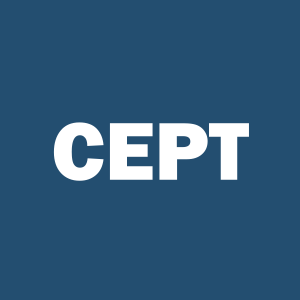Filed by Cantor Equity Partners II, Inc.
pursuant to Rule 425 under the Securities Act
of 1933
and deemed filed pursuant to Rule 14a-12
under the Securities Exchange Act of 1934
Subject Company: Cantor Equity Partners II, Inc.
Commission File No. 001-42630
Securitize Holdings, Inc.
Date: November 10, 2025
As previously disclosed, on October 27, 2025, Cantor Equity Partners
II, Inc. (“CEPT”), a Cayman Islands exempted company, and Securitize, Inc., a Delaware corporation (“Securitize”),
entered into a Business Combination Agreement (the “Business Combination Agreement”), with Securitize Holdings, Inc., a Delaware
corporation (“Pubco”), Pinecrest Merger Sub, a Cayman Islands exempted company (“CEPT Merger Sub”)
and Senna Merger Sub, Inc., a Delaware corporation (“Securitize Merger Sub”).
On November 5, 2025, Carlos Domingo, the CEO of Securitize,
held an interview with Forbes. A copy of the transcript is below:
***
By Nina Bambysheva
November 5, 2025
On Tuesday, Miami-based fintech Securitize, best known for tokenizing
BlackRock’s $3 billion BUIDL fund, announced plans to go public via a merger with a SPAC sponsored by an affiliate of Cantor Fitzgerald.
The deal values Securitize at $1.25 billion pre-money at a time when crypto firms are racing toward public markets and the real-world
asset (RWA) tokenization market has ballooned 135% in the past year to $35 billion.
We sat down with CEO Carlos Domingo to discuss why Securitize is
going public now and when tokenization will finally go mainstream. The transcript was edited for clarity.
Forbes: So when exactly are you planning to list?
Carlos Domingo: We have to get the U.S. government to open first—minor
detail! Now that we’ve announced the merger with Cantor Equity Partners II, the next step is to file with the SEC a document called
an S-4, which is similar to an S-1—the filing companies use to go public via an IPO. It has to be reviewed by the SEC, which requires
the government to be open. Assuming this happens in a timely manner, it shouldn’t take longer than two to three months. Then the
SPAC will conduct a proxy vote to approve the merger, and we’ll go public hopefully early next year.
Forbes: Cantor is now one of the primary banks servicing the crypto
industry, but what else made them an attractive partner?
Carlos Domingo: Cantor is not only successful in crypto. Historically,
they’ve been one of the best SPAC sponsors who really understand the process. They’re also an investment bank, so they help
raise the PIPE financing as well. Their SPAC structure is very clean: no warrants or rights, just common stock and sponsor shares. That
simplicity helps avoid dilution and price depression.
Forbes: How long have you been planning this, and why now?
Carlos Domingo: Actually, not that long. If you’d asked
me at the beginning of this year, it wasn’t even on my radar. We were planning to stay private and maybe raise more money. Markets
weren’t open. Remember, around March and April, things weren’t great. But by May and June, equity markets started performing
better, and in June Circle did their IPO, which was extremely successful. Congratulations to our friends there. So in July, at our quarterly
board meeting I told the board, “Markets are open. We’re ready to apply to be a public company. We’re already a regulated
entity, we’ve had audits since 2018, all the stuff required. I think we can do this.” And here we are in October. It’s
been a pretty fast three months of work.
Forbes: What changes for you once you become a public company,
beyond the obvious? Are there new opportunities you pursue that were harder to access before?
Carlos Domingo: First, our credibility will increase immediately
once we’re publicly traded. It shows that we have audited financials, proper governance—all the requirements to be public.
We’ll also have a large balance sheet, so any questions about our long-term viability disappear. Keep in mind, we work with the
largest financial institutions in the world, and that requires trust not just in our technology but in our company for the foreseeable
future. Second, we’ll have access to capital markets. We can raise money in a different way, use liquid stock for financing or acquisitions—things
that are difficult as a private firm. Third, visibility. Once public, more people will know who we are and what we do, and that leads
to more business.
Forbes: Can you give us an overview of the business today and
the growth you’ve seen recently?
Carlos Domingo: We’ve already filed an investor deck with
the SEC so it’s public. We’ve only published data up to Q2 2025 since we started the process in Q3. Our revenue has grown
ninefold in the last 18 months. Really strong growth, much more than I expected. We’ve been profitable for two years and forecast
around $69 million in revenue and will be profitable in 2025.
Forbes: We’ve been talking about tokenization for years,
and you’ve been at it for eight. How do you think about where we are today?
Carlos
Domingo: One of the things that has radically changed in the U.S. is the regulatory environment. President Trump won elections, the
new SEC leadership—Paul Atkins as chairman and the crypto task force under Commissioner Peirce—the environment is night and
day compared to before. Also, tokenization is now embraced more widely. Everyone talks about it. Not just BlackRock, but people like Vlad
from Robinhood, Brian Armstrong from Coinbase—companies that typically haven’t been talking about the space. So tokenization
has become a big focus for many companies, which is great. Ultimately, we want to grow the pie.
Forbes: What else do companies like yours need to operate comfortably
in the U.S.?
Carlos Domingo: There’s always room for improvement. Some
legacy rules can be modernized, like those around transfer agents and record-keeping. For the most part, we have what we need. What we
also need—this is going to be an unpopular opinion—is enforcement actions towards people breaking the law. Because they also
get in the way of those trying to follow regulations.
Forbes: There seems to be this tension between companies offering
wrappers and those focused on native issuance, like yours. Which wins?
Carlos Domingo: The real, legal things win. Companies doing regulatory
arbitrage or illegal offerings don’t last. I remember when we were trying to tokenize credit products in 2021, and people were telling
me “Look, you can get this from Celsius or BlockFi.” None of those companies exist anymore. Some wrappers, like Robinhood’s,
are, in my opinion, a bad idea, but legal. And there are those that are a bad idea and illegal. The moment you have the native, tokenized
version of those wrappers, they go down to zero and die. Why buy a wrapper from a random company that you don’t even know when the
issuer of the underlying security tells you they don’t represent my security? Now, native tokens offer the standard equity holder
rights: voting, dividends, etc. There’s no question that that’s the model that wins.
Forbes: For now, tokenization seems driven mostly by crypto players.
What’s your go-to-market strategy for traditional finance?
Carlos Domingo: Good question. TradFi is obviously embracing tokenization
from a product-creation perspective: we work with firms like BNY and BlackRock. But from a consumption perspective the activity is driven
mostly by crypto players. What’s missing is the ability of TradFi players to use stablecoins because stablecoins play a big role
in manifesting the benefits of tokenization—having tokenized dollars alongside tokenized securities. I think the GENIUS Act has
accomplished that already. Obviously, it will take time for everyone to adopt it, but it’s getting there.
The second thing is the ability to use the infrastructure in a more
seamless way—to access blockchains, to have wallets integrated with the endpoints used in the applications TradFi institutions rely
on. That’s the next step for tokenization to be broadly adopted by TradFi. If you had asked me a year ago, I would have told you
this would still take a long time. At this point, I think we’re looking at probably less than three to five years.
Forbes: What do you think will be the “killer product”
once everything is set up—tokenized equities, treasuries, or funds?
Carlos Domingo: All of the above. We think tokenized treasuries
have massive growth ahead because in traditional finance you have more treasuries than dollars. In crypto, you have $200 billion of tokenized
dollars and only $8 billion of tokenized treasuries. So we think tokenized treasuries should naturally grow to become bigger than stablecoins.
Number two, funds. We just released the CLO (collateralized loan obligation) product with BNY, and we’re excited about that space.
There are so many varieties of things you can tokenize there that there’s a ton of work to do. And then, obviously, public stocks,
done the right way.
Forbes: And “the right way” means working directly
with security issuers?
Carlos Domingo: Right. I was talking to a crypto company the other
day, and their executive was telling me, “Look, we’ve put this asset into one of these wrappers but we have to put all these
disclaimers on it and nobody wants to touch it.” Because what’s the advantage of buying this and taking so much risk? So these
are not sustainable long-term products. As I mentioned, as soon as native tokenization happens, they will die. And I think we’ll
see that happening in 2026 for sure.
Forbes: Large exchanges like Kraken and Gemini offer wrapped stocks.
Carlos Domingo: Backed Finance, issuer of xStocks, has them as
distribution partners. You know what’s their total AUM? $100 million (it’s $130 million to be precise). That tells
you everything. You’re looking at a market that is like $40 trillion, and they’ve managed to tokenize $100 million. Nobody
cares.
Forbes: What’s the progress on Converge, the blockchain
you’re building with Ethena Labs?
Carlos Domingo: We aren’t sharing it publicly yet. We’re
working closely with Ethena, they are one of the largest users of BUIDL (BlackRock’s money market fund, tokenized by Securitize).
We are considering the best positioning for the product because so many new blockchains like Arc (from Circle) and Tempo (Stripe) have
launched.
Forbes: BlackRock is probably your highest profile partner, and
Larry Fink is a major proponent of tokenization. Have you met him?
Carlos Domingo: I’ve actually never met him in person. He’s
obviously one of the best spokespeople for tokenization. I don’t want to speak on their behalf but we are very excited to work with
BlackRock, they are a great partner.
Forbes: Is there anything in tokenization you think people still
misunderstand in a major way?
Carlos Domingo: I think that the topic we covered is, to me, one
of the most important things. Normal, everyday users have a hard time distinguishing between wrappers and native tokenization. Many of
these companies doing wrappers are misleading investors. They’ll tell you, “Oh, this is a tokenized Tesla,” when it’s
not a tokenized Tesla; it’s a tokenized something else. Institutions are more sophisticated, but even they often don’t know
how to tell them apart. That’s a problem. Securities are highly regulated. You can’t mislead investors, tell them you’re
selling one thing, and then give them something else.
Unfortunately, this activity happens and happens offshore. These companies
go to jurisdictions where they think no one will chase them, but the ones who ultimately suffer are investors. So I think communicating
that people need to do their research before buying something, understand exactly what they’re buying and make sure they’re
not being misled by the issuer.
***
Additional Information and Where to Find It
Pubco and Securitize intend to file with the Securities and Exchange
Commission (the “SEC”) a Registration Statement on Form S-4 (as may be amended, the “Registration Statement”),
which will include a preliminary proxy statement of CEPT and a prospectus (the “Proxy Statement/Prospectus”) in connection
with the business combination pursuant to the Business Combination Agreement (the “Business Combination”), the concurrent
private placement of certain Class A ordinary shares of CEPT (the “PIPE”), and any related transactions (collectively with
the Business Combination and the PIPE, the “Proposed Transactions”). The definitive proxy statement and other relevant documents
will be mailed to shareholders of CEPT as of a record date to be established for voting on the Business Combination and other matters
as described in the Proxy Statement/Prospectus. CEPT and/or Pubco will also file other documents regarding the Proposed Transactions with
the SEC. This communication does not contain all of the information that should be considered concerning the Proposed Transactions and
is not intended to form the basis of any investment decision or any other decision in respect of the Proposed Transactions. BEFORE MAKING
ANY VOTING OR INVESTMENT DECISION, SHAREHOLDERS OF CEPT AND OTHER INTERESTED PARTIES ARE URGED TO READ, WHEN AVAILABLE, THE PRELIMINARY
PROXY STATEMENT/PROSPECTUS, AND AMENDMENTS THERETO, AND THE DEFINITIVE PROXY STATEMENT/PROSPECTUS AND ALL OTHER RELEVANT DOCUMENTS FILED
OR THAT WILL BE FILED WITH THE SEC IN CONNECTION WITH CEPT’S SOLICITATION OF PROXIES FOR THE EXTRAORDINARY GENERAL MEETING OF ITS
SHAREHOLDERS TO BE HELD TO APPROVE THE PROPOSED TRANSACTIONS AND OTHER MATTERS AS DESCRIBED IN THE PROXY STATEMENT/PROSPECTUS BECAUSE
THESE DOCUMENTS WILL CONTAIN IMPORTANT INFORMATION ABOUT CEPT, PUBCO, SECURITIZE AND THE PROPOSED TRANSACTIONS. Investors and security
holders will also be able to obtain copies of the Registration Statement and the Proxy Statement/Prospectus and all other documents filed
or that will be filed with the SEC by CEPT and Pubco, without charge, once available, on the SEC’s website at www.sec.gov or by
directing a request to: Cantor Equity Partners II, Inc., 110 East 59th Street, New York, NY 10022; e-mail: CantorEquityPartners@cantor.com,
or upon written request to Securitize, Inc., via email at tom.murphy@securitize.io, respectively.
NEITHER THE SEC NOR ANY STATE SECURITIES REGULATORY AGENCY HAS APPROVED
OR DISAPPROVED THE PROPOSED TRANSACTIONS DESCRIBED HEREIN, PASSED UPON THE MERITS OR FAIRNESS OF THE BUSINESS COMBINATION OR ANY RELATED
TRANSACTIONS OR PASSED UPON THE ADEQUACY OR ACCURACY OF THE DISCLOSURE IN THIS COMMUNICATION. ANY REPRESENTATION TO THE CONTRARY CONSTITUTES
A CRIMINAL OFFENSE.
The Class A ordinary shares to be issued in the PIPE have not been
registered under the Securities Act and may not be offered or sold in the United States absent registration or an applicable exemption
from the registration requirements of the Securities Act.
Participants in the Solicitation
CEPT, Pubco, Securitize and their respective directors, executive officers,
and certain of their shareholders and other members of management and employees may be deemed under SEC rules to be participants in the
solicitation of proxies from CEPT’s shareholders in connection with the Proposed Transactions. A list of the names of such persons,
and information regarding their interests in the Proposed Transactions and their ownership of CEPT’s securities are, or will be,
contained in CEPT’s filings with the SEC, including CEPT’s prospectus filed on May 2, 2025. Additional information regarding
the interests of the persons who may, under SEC rules, be deemed participants in the solicitation of proxies from CEPT’s shareholders
in connection with the Proposed Transactions, including the names and interests of CEPT’s, Pubco’s and Securitize’s
directors and executive officers, will be set forth in the Proxy Statement/Prospectus, which is expected to be filed by Pubco, Securitize
and CEPT, as applicable, with the SEC. Investors and security holders may obtain free copies of these documents as described above.
No Offer or Solicitation
This communication and the information contained herein are for informational
purposes only and are not a proxy statement or solicitation of a proxy, consent or authorization with respect to any securities or in
respect of the Proposed Transactions and shall not constitute an offer to sell or exchange, or a solicitation of an offer to buy or exchange
the securities of CEPT or Pubco, or any commodity or instrument or related derivative, nor shall there be any sale of any such securities
in any state or jurisdiction in which such offer, solicitation, sale or exchange would be unlawful prior to registration or qualification
under the securities laws of such state or jurisdiction. No offer of securities shall be made except by means of a prospectus meeting
the requirements of the Securities Act or an exemption therefrom. Investors should consult with their counsel as to the applicable requirements
for a purchaser to avail itself of any exemption under the Securities Act.
Forward-Looking Statements
This communication contains certain forward-looking statements within
the meaning of the U.S. federal securities laws with respect to the Proposed Transactions involving Pubco, Securitize and CEPT, including
expectations, hopes, beliefs, intentions, plans, prospects, financial results or strategies regarding Pubco, Securitize, CEPT and the
Proposed Transactions and statements regarding the anticipated benefits and timing of the completion of the Proposed Transactions, the
assets held by Pubco and Securitize, Pubco’s listing on any securities exchange, the macro and political conditions surrounding
digital assets, the planned business strategy, plans and use of proceeds, objectives of management for future operations of Pubco, pro
forma ownership of Pubco, the upside potential and opportunity for investors, Pubco’s plan for value creation and strategic advantages,
market size and growth opportunities, investor benefits, regulatory conditions, competitive position, technological and market trends,
future financial condition and performance and expected financial impacts of the Proposed Transactions, the satisfaction of closing conditions
to the Proposed Transactions and the level of redemptions of CEPT’s public shareholders, and Pubco’s and Securitize’s
expectations, intentions, strategies, assumptions or beliefs about future events, results of operations or performance or that do not
solely relate to historical or current facts. These forward-looking statements generally are identified by the words “believe,”
“project,” “expect,” “anticipate,” “estimate,” “intend,” “strategy,”
“future,” “opportunity,” “potential,” “plan,” “may,” “should,”
“will,” “would,” “will be,” “will continue,” “will likely result,” and similar
expressions. Forward-looking statements are predictions, projections and other statements about future events or conditions that are based
on current expectations and assumptions and, as a result, are subject to risks and uncertainties. Many factors could cause actual future
events to differ materially from the forward-looking statements in this communication, including, but not limited to: the risk that the
Proposed Transactions may not be completed in a timely manner or at all, which may adversely affect the price of CEPT’s securities;
the risk that the Proposed Transactions may not be completed by CEPT’s business combination deadline; the failure by the parties
to the Business Combination Agreement to satisfy the conditions to the consummation of the Business Combination, including the approval
of CEPT’s shareholders, or the consummation of the PIPE; failure to realize the anticipated benefits of the Proposed Transactions;
the level of redemptions of CEPT’s public shareholders which may reduce the public float of, reduce the liquidity of the trading
market of, and/or maintain the quotation, listing, or trading of the Class A ordinary shares or the shares of common stock of Pubco; the
lack of a third-party fairness opinion in determining whether or not to pursue the Business Combination; the failure of Pubco to obtain
or maintain the listing of its securities on any securities exchange after closing of the Proposed Transactions; costs related to the
Proposed Transactions and as a result of becoming a public company; changes in business, market, financial, political and regulatory conditions;
risks relating to Pubco’s anticipated operations and business, including the highly volatile nature of the price of digital assets;
risks related to increased competition in the industries in which Pubco will operate; risks relating to significant legal, commercial,
regulatory and technical uncertainty regarding digital assets and tokenization; risks relating to the treatment of digital assets for
U.S. and foreign tax purposes; risks that after consummation of the Proposed Transactions, Pubco experiences difficulties managing its
growth and expanding operations; challenges in implementing Pubco’s business plan (including expanding and/or growing its advisory
services business) due to operational challenges, significant competition and regulation; being considered to be a “shell company”
by any stock exchange on which Pubco’s common stock will be listed or by the SEC, which may impact Pubco’s ability to list
Pubco’s common stock and restrict reliance on certain rules or forms in connection with the offering, sale or resale of securities;
the outcome of any potential legal proceedings that may be instituted against Pubco, Securitize, CEPT or others following announcement
of the Proposed Transactions, and those risk factors discussed in documents that Pubco and/or CEPT filed, or that will be filed, with
the SEC.
The foregoing list of risk factors is not exhaustive. You should carefully
consider the foregoing factors and the other risks and uncertainties described in the “Risk Factors” section of the final
prospectus of CEPT dated as of May 1, 2025 and filed by CEPT with the SEC on May 2, 2025, CEPT’s Quarterly Reports on Form 10-Q,
CEPT’s Annual Report on Form 10-K and the Registration Statement that will be filed by Pubco and Securitize and the Proxy Statement/Prospectus
contained therein, and other documents filed by CEPT and Pubco from time to time with the SEC. These filings do or will identify and address
other important risks and uncertainties that could cause actual events and results to differ materially from those contained in the forward-looking
statements. There may be additional risks that CEPT, Securitize and Pubco do not presently know, or that CEPT, Securitize and Pubco currently
believe are immaterial that could also cause actual results to differ from those contained in the forward-looking statements.
Forward-looking statements speak only as of the date they are made.
Readers are cautioned not to put undue reliance on forward-looking statements, and none of CEPT, Securitize or Pubco assumes any obligation
and does not intend to update or revise these forward-looking statements, whether as a result of new information, future events, or otherwise.
None of CEPT, Securitize or Pubco gives any assurance that any of CEPT, Securitize or Pubco will achieve its expectations. The inclusion
of any statement in this communication does not constitute an admission by CEPT, Securitize or Pubco or any other person that the events
or circumstances described in such statement are material.
5







